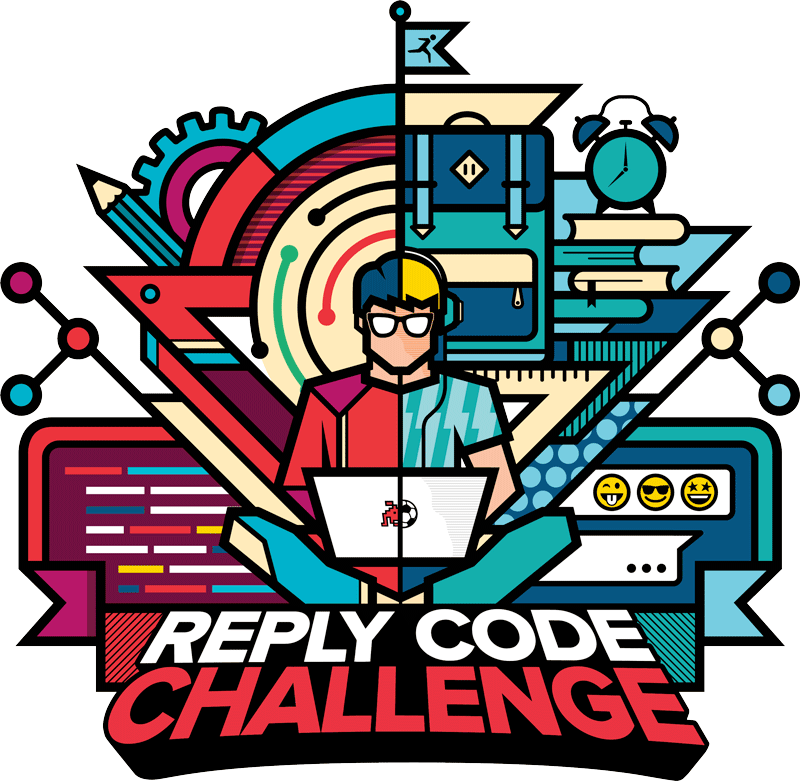Login🔥
New to Challenges? Register➡️Are you a Replyer?
Access with Reply credentials
Coding through emotional involvement: the innovative approach of the University of Trento
“Sorry for the time, later we have an activity in collaboration with Muse, the science museum, as part of Arduino week”.
Alberto Montresor is a professor of computer science and algorithms & data structures at the University of Trento, but it is an oversimplification to describe him in this way. Always grappling with new initiatives, he sounds more like listening to an activity organizer, from extracurricular ones to real challenges among the students. The latest activity he was involved in was his students victory in the University Students League of the Reply Code Challenge 2022 and 2023.
“But I really consider myself as a computer scientist,” says professor Montresor, laughing: “Here, at home, I have a 3D printer”.
League of the Reply Code Challenge 2022

Professor, how do these initiatives come about?
Some years ago we started with a coding Hackaton as part of the ICT days, an annual event within which we show the many activities of the university department. The idea was to involve the students and give them the chance to get involved differently compared to classical didactics.
Then we joined the HashCode for six years. Participation was a success: we had over 140 students at 11 pm in the university.
During the pandemic, we had to change our plans, moving first to online events with 160 students and now to hybrid events, both in-person and online.
The Reply Code Challenge represents exactly what we are looking for: allowing students to challenge themselves in a stimulating and fun way, free from the typical evaluation model of classical teaching.
From our side, for instance, we built a FabLab within the university that should become the core to do all the extracurricular activities. This way we provide a real lab, with some materials, while in other cases the students bring what they need and use the space free to try out their own projects.
What motivates you to get so involved in these initiatives?
There is a pedagogical theory called Constructivism, according to which a student learns much more effectively if they are also emotionally involved in what they are doing. An activity such as the FabLab involves students for three to five years, allowing them to realize their projects in practice, in a way that is totally unrelated to classic academic assessment.
For a student, this is unusual, and not everyone understands this opportunity immediately, but the involvement that is achieved is incomparable to a classic didactic.
For this reason, having a rich and diversified proposal allows each individual to find the activity that most engages him or her, beyond the pure and simple university courses. Moreover, this scheme goes beyond the classic academic assessment criteria, encouraging students to get involved, but without a grade or judgement.
In my opinion, this is one of the aspects why the Hash Code or the Reply Code Challenge are so popular. The other winning aspect, which is in line with what we also try to propose, is that they involve realistic cases.
proposal allows each individual to find the
activity that most engages him or her,
beyond the pure and simple university courses.
What do you mean by “realistic”? Tell us more about this point
Look, beyond the difficulty of these challenges, the aspect that I think is really an added value is that the problems proposed concern cases that they might also have to face in the world of work. We want to prepare the students to be able to cope with all the concrete problems they will encounter when they leave here.
This means, above all, being able to work in a team, which is a fundamental prerogative of all the initiatives we take part in. If they were individual competitions they wouldn't make sense and I don't think we would invest so much in them. The teamwork aspect is important, even when we go to high school I push for team projects, it's the best way to learn and get involved.
Do these all originate as your initiatives or is this a specific university plan?
The whole university is very much in line with these projects. It may seem like I'm behind it, but in reality, it's a mentality shared with the other professors and stems from a precise desire on the part of the university.
In addition, in the same way that we look at collaborations with external bodies, such as Reply, we also try to develop projects with other universities, both in Italy and abroad.
At an international level there is a lot of collaboration, we are part of several networks including The European Consortium Of Innovative Universities and the Eit Digital. In this case, it is also easy thanks to the presence of European funds that give everyone the interest to create interesting projects.
Looking at the Italian scene, however, it is not so simple, partly because there are fewer funds and it is more difficult to collaborate. Often, there is simply a lack of opportunities, even though, for example, part of the FabLab was developed thanks to funding from the Ministry for Departments of Excellence.
professors and stems from a precise desire on
the part of the university.


That's the big challenge ahead of us: increasing the accessibility of the subject without losing quality. Computer science is perceived as a subject for nerds, but those who come to us then discover many facets that are not so technical. To do this, one step is certainly to go to high schools and secondary schools, showing the various aspects without stopping at programming or pure exercises. This would also help to reduce the currently significant gap between boys and girls: nationally, only 12% of students are girls, so we still need to invest and look for alternative ways.
Want to be the next winner?
Register on Reply Challenges and get updates on the next challenge!